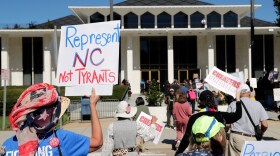The North Carolina Supreme Court has issued three rulings that will have major impacts on how the state conducts elections.
The court restored a requirement that voters show an ID at the polls; it reversed a previous decision that struck down the legislature's latest round of redistricting; and it invalidated another ruling that would have allowed people with felony convictions to vote after completing their sentences.
WUNC's Will Michaels speaks with WUNC political reporter Rusty Jacobs to get his breakdown of the state Supreme Court's decisions.
Will Michaels: Let's get straight to the big question. What do they mean? Let's start with the voter ID law.
Rusty Jacobs: You'll remember that in 2018, a majority of North Carolina voters, about 56%, approved a constitutional amendment requiring a photo ID at the polls. It was left to the legislature to enact legislation that would implement that requirement. That law was challenged and last year, the courts deemed it had an unconstitutional disparate impact on Black voters.
The state Supreme Court, now with a Republican majority, said that the previous court got it wrong. That rule will go into effect and according to the state Board of Elections, there will be a photo ID requirement at the polls for the 2023 municipal elections.
Let's move on to the redistricting decision. Does that decision from the state Supreme Court now mean that partisan gerrymandering is legal in North Carolina?
No, what it means is that if lawmakers, the elected representatives of the people, want to write legislation outlawing partisan gerrymandering, they can do so. The ruling means, at least according to the Republican majority on the state Supreme Court, state courts have no business meddling in issues of partisan gerrymandering, legislators have the sole authority under the Constitution to redraw district maps. And it is not for courts to go in and apply what the Republican majority on the state Supreme Court has deemed vague standards, and undo the maps.
What about the decision of voting for people with felony convictions?
So there had been a ruling last year that the law requiring people with felony convictions to complete their sentence's entirety, not just prison sentences, but also complete all terms of probation and parole before they can have their voting rights restored. Previously, that was ruled unconstitutional. The state Supreme Court has reversed that. And that basically means that once again, people with felony convictions who are still on parole, still on probation may be trying to just pay fines, they will not get their voting rights restored until they've completed every term of their sentence.
So these are massive victories for Republicans who will now draw voting maps for federal and state elections. And it would seem that these decisions will lock in Republican majorities for a long time to come.
It could for sure, and that was the big concern among voting rights advocates and Democrats who challenged these maps. They said it's the will of the people, the voters, who should get to determine the outcomes of elections, not gerrymandered maps that predetermine outcomes.
But look, how you look at these rulings depends on what lens you're wearing when you're looking at them. Senate President Pro Tem Phil Berger, Republican leader, said that these rulings affirm, quote, Our Constitution cannot be exploited to fit the political whims of left wing Democrats, unquote.
But if you look at the statements from people like Eric Holder, former Attorney General for Barack Obama, who now leads a voting rights advocacy group called the National Redistricting Foundation, Robert Reaves, the state representative who is the Democratic leader in the state House, they say it's the political whims of the right, that led to today's ruling. They say the law hasn't changed when these maps were declared unconstitutional. What changed was the makeup of the court, because you'll remember in last year's midterms, Republicans won a majority on the state Supreme Court, Republican lawmakers promptly filed motions to have all these cases reheard, got rehearings and got the reversals they hoped for.








